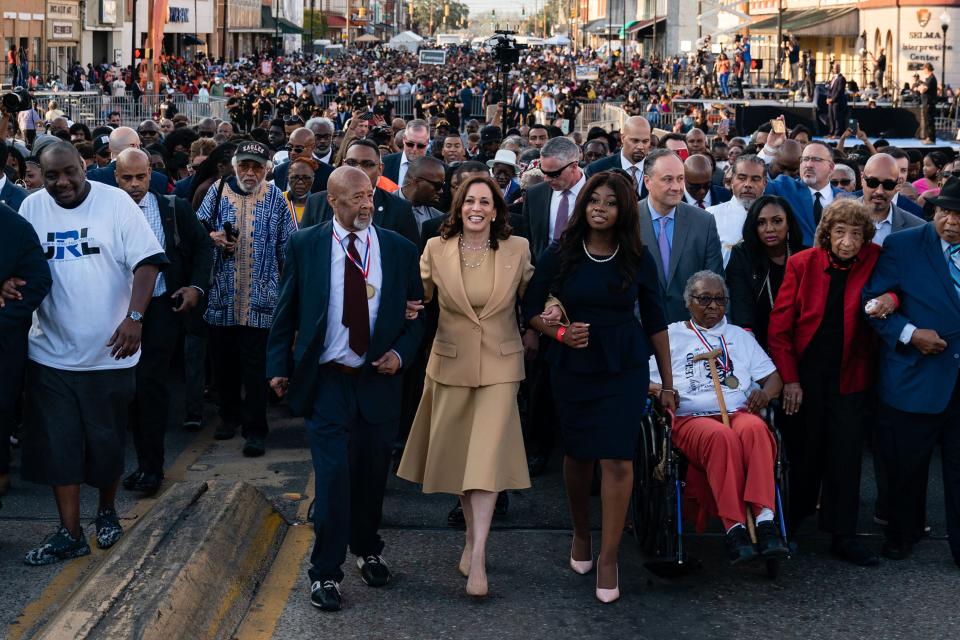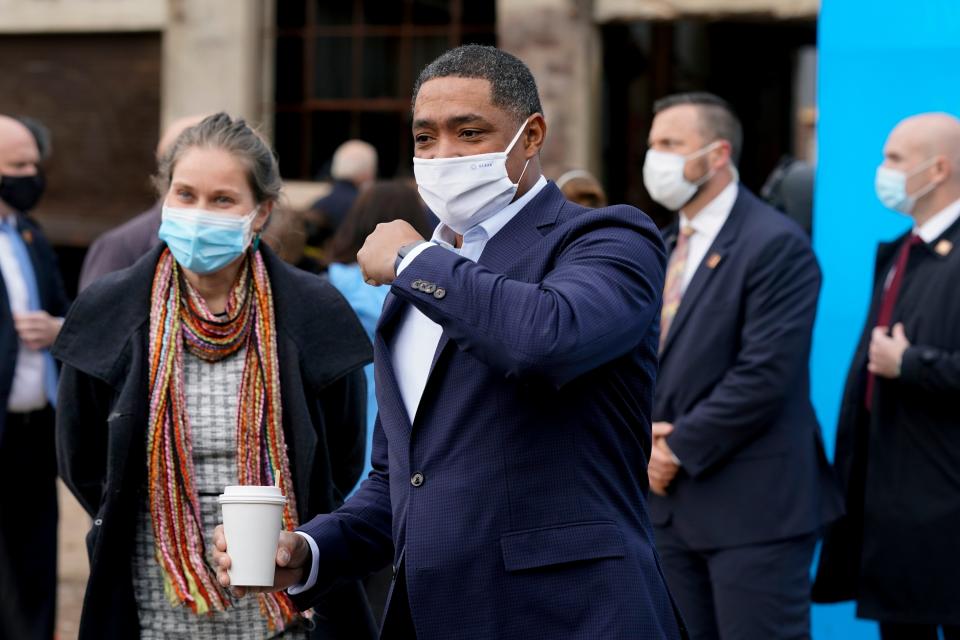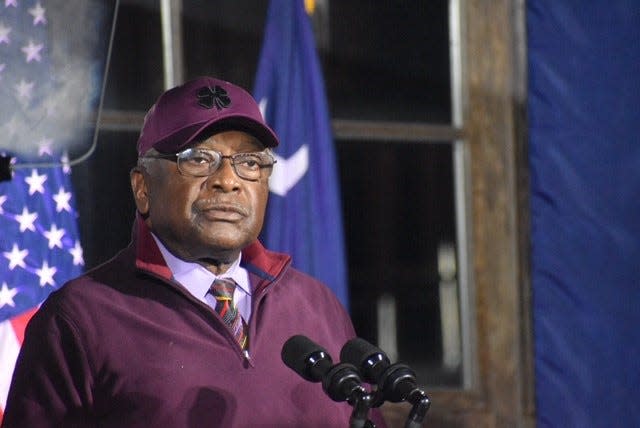Democrats urge Biden to use presidential powers, 'whatever means necessary' to protect voters
WASHINGTON – With federal voting rights legislation stalled in Congress, Democratic lawmakers and civil rights activists are calling on the Biden administration to issue a new executive order aimed at better protecting voters against restrictive state election laws.
Democrats and activists are increasingly disappointed with the lack of progress on passing sweeping voter protection legislation. And with high-stakes midterms elections looming, there's also growing concern about ballot access for voters of color — historically a key voting bloc for Democrats.
Rep. Joyce Beatty, , an Ohio Democrat and chair of the Congressional Black Caucus, said the Biden administration should "do whatever is necessary, whether that's an executive order, whether that is us figuring out a legislative approach that we can get through."
White House officials said they haven’t ruled out any avenues.
"Everything's on the table,’’ Cedric Richmond, senior advisor to the president and director of the White House Office of Public Engagement told USA TODAY.
He added: “Where there's constitutional things we can do you can look for us to do them.”

Executive authority has limits
Biden signed an executive order last March marking the commemoration of “Bloody Sunday,’’ when peaceful voting rights activists were beaten by state troopers in 1965 as they crossed the Edmund Pettus Bridge in Selma, Alabama.
The order directs federal agencies to expand access to voter registration and election information. Among other things, it urges federal agencies to allow workers to volunteer as poll workers and sets up a steering group to look into ways to improve voter access for Native Americans.
Voters of color have long faced barriers to casting ballots, including poll taxes and intimidation. Advocates contend election laws adopted by GOP-controlled legislatures aim to suppress turnout.
Republicans have said the bills protect against voter fraud.
By mid January, lawmakers in at least 27 states had introduced, pre-filed or carried over 250 bills with restrictive provisions, including imposing stricter ID requirements, according to the Brennan Center for Justice.
From early on, Biden backed Democratic measures to expand federal voting rights protections. He also urged Congress to pass the bills in his State of the Union address last month.
Vice President Harris, who has been tasked with leading the White House fight for voting rights, joined civil rights activists in Selma last month for the annual commemoration of the march.
Later that month, Harris unveiled recommendations to improve access for Native Americans and voters with disabilities. “We are fighting, all of us, together every day to safeguard and to strengthen the freedom to vote,’’ she said.
More: Harris steps into high-wire act on voting rights as pressure builds on election bills
More: ‘Time to march’: Hundreds gather in Selma to commemorate 57th anniversary of Bloody Sunday

White House officials defend their efforts, including last year's executive order. They said they had to first figure out what authority Biden had so they focused on federal agencies and pressing them to be innovative on voting rights.
For example, the Department of Veterans Affairs is trying to be designated as a voter registration location and the Department of Education is trying to distribute voter education to students.
Rep. G.K. Butterfield, chairman of the House Administration’s elections subcommittee, said he and other lawmakers have had discussions with White House officials about possibly issuing another executive order on voting rights.
But Butterfield, a Democrat from North Carolina, said he recognizes there are limitations to that authority.
“We can’t ask the president to sign an executive order that is unconstitutional so we have to make sure that it is permitted by law,’’ he said.
Some election experts agree there’s only so much the White House can do.
“The White House is doing what it can,’’ said David Becker, executive director of the nonpartisan Center for Election Innovation & Research, noting its efforts to make it easier to register at some federal agencies. “But there's not a lot that the White House can do on its own about congressional action.”
Some voting rights supporters say even an executive order wouldn't be enough.
“What I would like to see is legislation passed because what I don't want is for my rights to be up in the air based on someone rescinding an executive order,’’ said Georgia Rep. Nikema Williams, a Democrat who has pushed for federal voting rights legislation. “These are constitutional rights. My right to the ballot box should not be up to the whim of an executive order by which president is in office.’’
More: Voting rights in the USA: Inside a pivotal year for changes to American elections
More: New election laws could create barriers for voters with disabilities
Pushing for voting rights bills
Sen. Amy Klobuchar, who has made voting rights one of her signature issues, said Biden and Harris are also pushing to ensure states get more funding to run elections. But some of the pushback against restrictive elections laws must come from grassroots efforts in states.
“Some of this is a not on the official side, it's on the political side in terms of getting groups going in each state when these bills come up and putting a big spotlight on them,’’ said Klobuchar, a Democrat from Minnesota.

The House has passed voting rights bills, including the John Lewis Voting Rights Advancement Act, which sought to restore provisions in the 1965 Voting Rights Act requiring states with a history of voting discrimination to get federal approval before making election changes. The Senate has yet to approve the measures.
Klobuchar said there are still efforts to pass legislation.
“We will never be giving up on the long term, which is the Freedom to Vote Act,’’ she said. “We didn't sit in that room all summer just to let that die on the vine.''
Williams called it frustrating that the legislation has stalled in Congress.
“I applaud the Biden administration for putting the weight and the power of the White House behind this conversation,’’ she said. “But at the end of the day, we have work to do in the United States Senate. There are elections coming. We're continuing to educate people on the changes that have occurred. We shouldn't have to organize our way out of voter suppression.”
Richmond, the White House senior advisor, said talks are still underway to try to reach a compromise. Harris has a leading role in that effort, he said.
‘’But what we won't do is compromise our values or let anyone infringe upon the right to vote,’’ Richmond said. “That's going to be a fight that we're going to take to the people. We're going to take it to Congress and we're going to take it to the courts.’’
More: Voting rights activists are pushing to speak the language of all voters. It's not always English.
More: Senate said no to voting rights. Here's how civil rights activists are reigniting the fight

Justice officials urged to do more on voting rights
But some advocates demand more.
“I’d like to see the President use his bully pulpit to connect the assault on democracy and Ukraine to the assault on democracy here at home,’’ said Marc Morial, president of the National Urban League, adding that nothing, however, substitutes for the passage of these bills.
Rep. Raul Ruiz, chairman of the Congressional Hispanic Caucus, said no president has advocated more for voting rights than Biden. He noted that Harris, top White House officials and Biden’s cabinet have been outspoken on the issue.
“He has been pushing the envelope, period. Do we want more? We all want more,’’ said Ruiz, a Democrat from California. “Is it important to continue making this a salient issue? Yes.''
Advocates also say the responsibility to protect voter rights falls on the Department of Justice.
Morial said the administration must make sure Justice officials have enough resources to challenge restrictive laws adopted by states.
“They inherited a DOJ that had been hamstrung,’’ said Morial, noting that several of the agency’s leaders, including Kristen Clarke, assistant attorney general for Civil Rights, weren’t confirmed until late in 2021.
South Carolina Rep. James Clyburn, the Democratic whip, called out Attorney General Merrick Garland for not doing enough on voting rights. “When it comes to voting, the attorney general needs to step up his game,’’ Clyburn said.
Becker, of the Center for Election Innovation & Research, said lawsuits filed by the Justice Department are pending in states like Georgia and Texas, and he’s sure agency officials “are going to be out in force observing elections and primaries.’’
To help, the administration has doubled resources in the agency's Civil Rights Division and nominated voting rights leaders like Clarke and Vanita Gupta, now the associate attorney general, to head those efforts, said Richmond.
He said the White House also isn't giving up on winning the legislative fight, including pushing to change Senate rules to pass the bills.
“We're continuing to do the necessary work to galvanize or create momentum behind it," he said. ''The president has said that he thinks we should do whatever is necessary to get it across the finish line.''
Follow Deborah Berry on Twitter: @dberrygannett
This article originally appeared on USA TODAY: Voting rights: Biden urged to consider executive order to protect voters

 money
money 